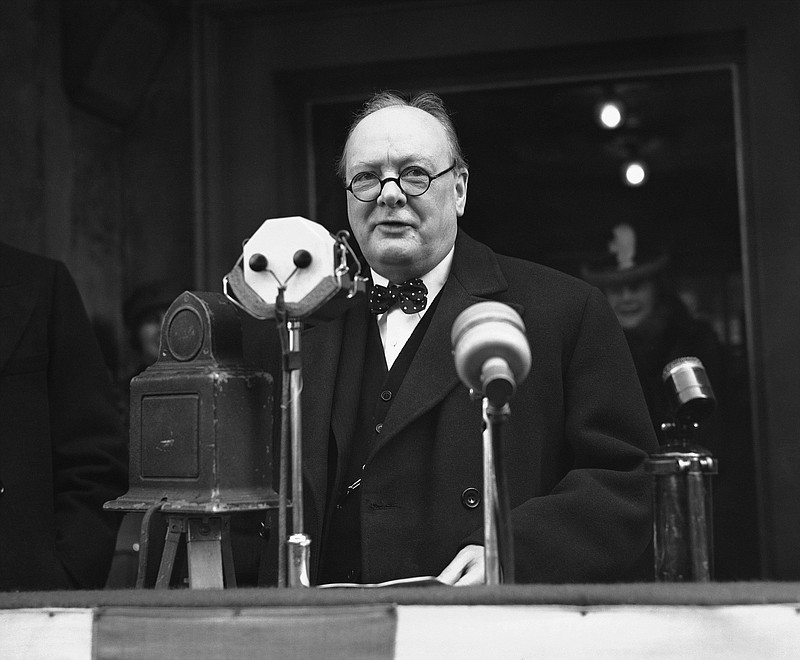What did Winston Churchill know that all of the smart people didn't?
Seventy-two years ago Monday, the once and future British prime minister delivered in Fulton, Mo., what has come to be known as "the Iron Curtain Speech," in which he warned the West of powers that would seek "totalitarian control."
Less than a year after the end of World War II, the United States, his own Great Britain and the Allied powers didn't want to study war any more. There were families to raise, jobs to secure, lives to live.
Indeed, Churchill's own conservative party had suffered a defeat at the polls in 1945, voters deciding they needed reforms and that perhaps the man who led them in war wasn't the man to lead them in peace.
As WWII drew to a close and agreements were hammered out and territory divided, though, the prime minister was wary of Russia and the annoying manner in which it already was ignoring historical boundaries and subverting previous agreements.
And, by March 1946, the influence the communist country was beginning to have hardly could be ignored.
"From Stettin in the Baltic to Trieste in the Adriatic," Churchill said in the speech, which he titled "Sinews of Peace" and which was attended by U.S. President Harry Truman, "an Iron Curtain has descended across the continent. Behind that line lie all the capitals of the ancient states of Central and Eastern Europe. Warsaw, Berlin, Prague, Vienna, Budapest, Belgrade, Bucharest and Sofia, all these famous cities and the populations around them lie in what I must call the Soviet sphere."
He also spoke of the need to keep nuclear weapons out of the hands of Western enemies, of the possibility that WWII "could have been prevented without the firing of a single shot," of the special relationship between the U.S. and the United Kingdom, and of the importance global peacekeeping organizations could be.
Yet, the best and the brightest minds were aghast and called out the former British leader as alarmist, imperialist, even racist.
The New York Times said he had painted "a dark picture of post-war Europe." The Chicago Sun Times said the speech spoke of "poisonous doctrines."
Churchill, still the leader of his Conservative Party, barely avoided a vote of censure in Parliament by the now- ruling Labour Party. To save face, Truman, who had read and approved the speech and clapped and nodded during its delivery, told a news conference he hadn't read it in advance, according to the book "Winston Churchill: Resolution, Defiance, Magnanimity, Good Will."
But the "curtain," in fact, had descended, and "the iron curtain" became the term for the dividing line between free and totalitarian nations in Europe for the next 43 years.
When the Soviet bloc fell apart in 1989, following the help of the alignment against the totalitarian regime by U.S. President Ronald Reagan and British Prime Minister Margaret Thatcher, the smart set said it was not a show of strength that brought it down but a natural progression of events.
The same intelligentsia continued to downplay the still-powerful but pseudo-democratic Russia for the next 25 years, even into the presidential term of one of their own, Barack Obama, who looked away and effected a largely hands-off policy as Russian annexed Crimea, invaded eastern Ukraine and attempted to be the power player in the Middle East by supporting other totalitarian regimes in the region.
Today, U.S. President Donald Trump won't ever be confused with Churchill, but his warnings about totalitarian states around the world, from Iran to Korea, about terrorists who can too easily come into this country, and about the cost of illegal immigrants already here fall on the same deaf ears the former prime minister's "iron curtain" speech did.
The very terms that were applied to the 1946 speech - alarmist, imperialist, racist - are applied to him.
Similarly, Western Europe, now an amalgam of socialist-lite countries, went about its business - until immigrants and refugees began to pour in and once again presented threats of terrorism and voting power. Now it wonders where the next Churchill might be found.
Ironically, Hollywood has just dragged out the original.
In fact, the film industry, run by the type of people who called down Churchill's speech, brought back to life the former prime minister's words and leadership over the past year with the release of the World War II films "Dunkirk" and "Darkest Hour."
On Sunday night, in a world sorely missing figures who lack the stature of the former British leader, the Academy of Motion Picture Arts and Sciences voters gave the two movies a combined five Academy Awards.
We won't hold our breath that the left will see the irony of the movies praising the type of leadership its best and brightest creators eschew, but we hope those who see the movies - and vote - will remember how much better off they are with freedom than with totalitarianism.
